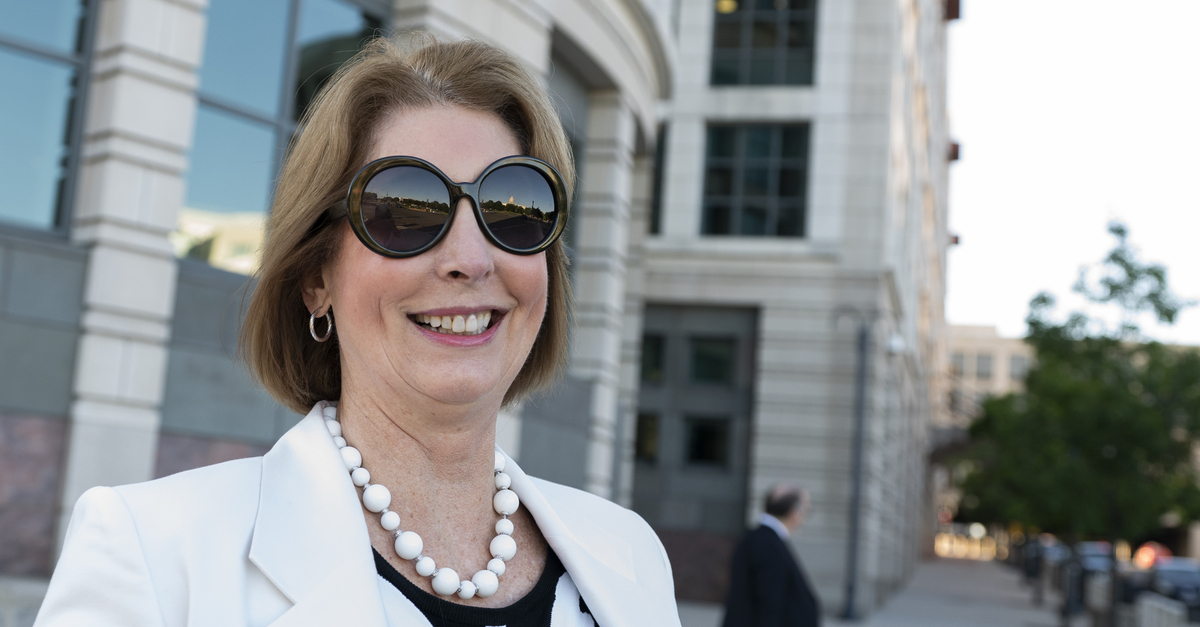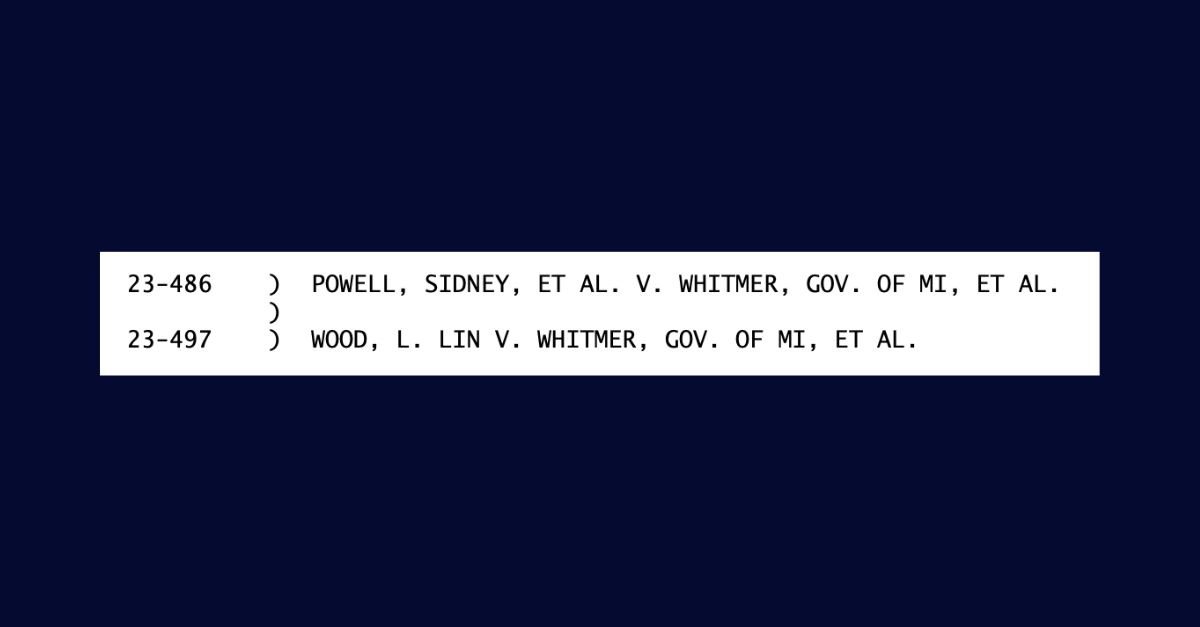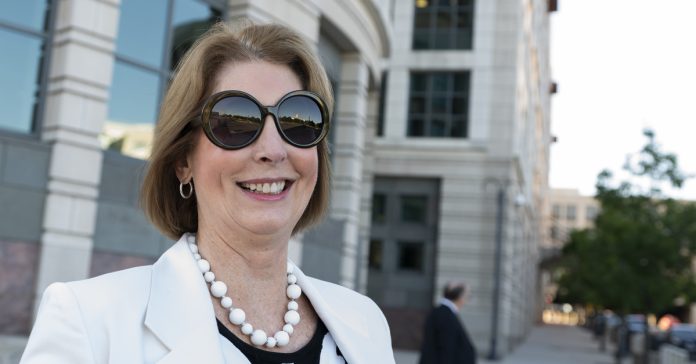
FILE – Sidney Powell, an attorney for former President Donald Trump, leaves the federal court in Washington, June 24, 2021. (AP Photo/Manuel Balce Ceneta, File)
The U.S. Supreme Court on Tuesday declined to hear an appeal filed by a group of attorneys who were sanctioned for their work to keep Donald Trump in the White House after he lost the 2020 election.
In an order list, the nation’s high court denied certiorari to Sidney Powell, as well as fellow lawyers Brandon Johnson, Howard Kleinhendler, Julia Haller, Gregory Rohl, and Scott Hagerstrom.
Each of the so-called “Kraken” attorneys — an umbrella term used by Powell herself which references a phrase from the 1981 Desmond Davis-Ray Harryhausen film “Clash of the Titans” — were sanctioned after filing a lawsuit on behalf of three Republican Party county chairs and three would-be false electors in Michigan.
The lawsuit filed by the pro-Trump attorneys contained unproven claims of election fraud and sought to decertify the results in the Wolverine State — weeks after voting occurred. Ultimately, U.S. District Judge Linda Parker found those claims meritless and unlikely to succeed in any court — describing the allegations as lacking legally-acceptable evidence. The judge characterized the legal arguments as “an amalgamation of theories, conjecture, and speculation.”
The court also determined the lawsuit was filed much too late anyway.
The City of Detroit joined in the litigation as a permissive intervenor and moved for sanctions, including bar referral, against the attorneys for filing the lawsuits. Michigan, in turn, requested sanctions as well.
After the sanctions motions hearing, the district court ordered the “Kraken” group to pay $21,964.75 to Michigan and $153,285.62 to Detroit — and referred each of the attorneys for professional misconduct investigations to their respective legal licensing boards — in order to deter future such lawsuits “designed primarily to spread the narrative that our election processes are rigged.”
As officers of the court, lawyers are, to a certain degree, responsible for their clients and owe duties to the judiciary, the public, and the legal profession. And, by filing the lawsuit over false fraud allegations, the “Kraken” lawyers did not meet those expectations, Parker ruled.
“The sanctity of both the courtroom and the litigation process are preserved only when attorneys adhere to this oath and follow the rules, and only when courts impose sanctions when attorneys do not,” the judge wrote in her 110-page opinion and order. “And despite the haze of confusion, commotion, and chaos counsel intentionally attempted to create by filing this lawsuit, one thing is perfectly clear: Plaintiffs’ attorneys have scorned their oath, flouted the rules, and attempted to undermine the integrity of the judiciary along the way.”
In September 2022, the “Kraken” attorneys appealed their sanctions before the U.S. Circuit Court of Appeals for the Sixth Circuit.
On appeal, the Sixth Circuit panel found “the district court awarded fees for a number of tasks that bore little connection to sanctionable conduct” and reduced the sanctions awards for Michigan and Detroit to $19,639.75 and $132,810.62, respectively.
The full circuit declined to rehear en banc and the mandate was stayed pending whether the nine justices would consider the case.
They did not. This, Powell said, was a disappointment — likening the failed Michigan sanctions-avoiding efforts to more successful efforts in Wisconsin. On Tuesday, the nation’s high court rejected an appeal of a sanctions denial order issued by the 7th Circuit.
“We appreciate the Court’s rejection of Governor Evers continued efforts to sanction us in Wisconsin, but we are very disappointed the Supreme Court is not taking the King case to resolve multiple circuit splits in the application of Rule 11 which affects every lawyer in the country,” Powell told Law&Crime in an email.
“The Court is allowing a dangerous precedent to stand that puts at risk every lawyer who represents an unpopular cause or client,” her statement went on. “It will make it more difficult for individuals to obtain representation, and it is causing a pervasive ‘chilling’ effect on our First Amendment right to petition the government for redress of grievances. At bottom, it will make it far more difficult primarily for conservatives to find legal counsel for any fight — but especially an election challenge. And sadly, that is exactly what the Left wants. They don’t want lawyers to be able to fight for you — if you disagree with them. It is a sad day for what remains of the Rule of Law.”
Representatives from Michigan Gov. Gretchen Whitmer’s office and the city of Detroit did not immediately respond to Law&Crime’s request for comment.
The Supreme Court on Tuesday also declined to hear an appeal by lawyer L. Lin Wood — who is no longer a practicing attorney — in a separate but related case over the same underlying issue over the Detroit sanctions. Wood gave up his law license in the summer of 2023 in exchange for the Georgia State Bar dropping disciplinary charges against him. The two cases over the Michigan sanctions would have likely been consolidated and were grouped together by a series of open parenthetical marks by the Supreme Court.

A snippet of an orders list from the U.S. Supreme Court in which two cases might have been consolidated had the petitions not been denied.
Have a tip we should know? [email protected]

